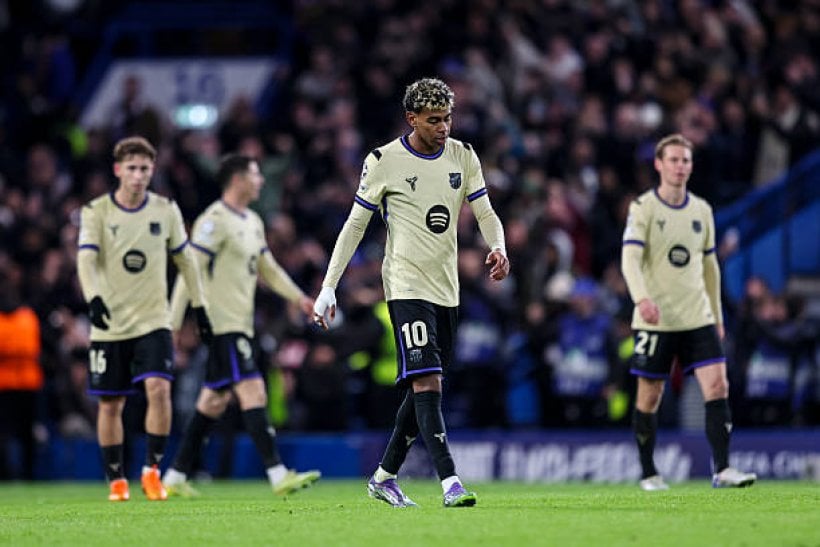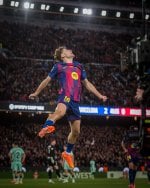
Four Weaknesses Reveal Barcelona's Failure Against Chelsea
Barcelona's failure against Chelsea at Stamford Bridge revealed four major weaknesses that led the team to a heavy 3-0 defeat, according to the Spanish newspaper "Sport."
The defeat highlighted the team's problems in midfield, attack, and defense, as well as the lack of an alternative plan under coach Hans Flick's leadership.
1- Chaos in the midfield
Pedri's absence had a significant impact on Barcelona's balance. Hans Flick tried to adjust the players' positions but failed to compensate for the captain's absence, which affected ball control and pressing in midfield. De Jong was unable to perform at the required level and lost the ball that led to the second goal. Meanwhile, Marc Casado was not called up to replace Pedri despite his ability to provide both offensive and defensive support.
2- Weak and scattered attack
Barcelona's frontline lacked strength and presence, and the changes made did not address this. Lewandowski struggled against Chelsea's defense, Raphinha did not make a sufficient impact after coming on, while Lamine Yamal had difficulty keeping up with Cucurella on the right flank. The newspaper confirmed that the young player still needs to gain enough experience to adapt to major matches in the Champions League.
3- The Impact of Iñigo Martínez's Departure
The absence of the defender was clearly evident, as Araújo failed to take on the responsibility of the advanced central defense, leading to his sending off after a challenge on Cucurella in the 44th minute. The team lost the defensive organization that Iñigo provided, while the other defenders, such as Koundé and Koulibaly, struggled to cope with Chelsea players who were able to break through the defense easily.
4- Lack of an alternative plan for Flick
The coach did not change his approach despite playing with ten men, and Barcelona's attempts to maintain high pressing and open play continued, which allowed Chelsea to dominate the match. The newspaper confirmed that the lack of an alternative plan negatively affected the team, making counterattacks almost limited and the offensive effectiveness weak.
Sport newspaper explained that these four points summarize Barcelona's failure in the Stamford Bridge match and highlight the challenges the team faces in major games under Flick's leadership, amid the need to reorganize the midfield, attack, and defense, as well as to develop alternative plans to face top teams in the Champions League.
The defeat highlighted the team's problems in midfield, attack, and defense, as well as the lack of an alternative plan under coach Hans Flick's leadership.
1- Chaos in the midfield
Pedri's absence had a significant impact on Barcelona's balance. Hans Flick tried to adjust the players' positions but failed to compensate for the captain's absence, which affected ball control and pressing in midfield. De Jong was unable to perform at the required level and lost the ball that led to the second goal. Meanwhile, Marc Casado was not called up to replace Pedri despite his ability to provide both offensive and defensive support.
2- Weak and scattered attack
Barcelona's frontline lacked strength and presence, and the changes made did not address this. Lewandowski struggled against Chelsea's defense, Raphinha did not make a sufficient impact after coming on, while Lamine Yamal had difficulty keeping up with Cucurella on the right flank. The newspaper confirmed that the young player still needs to gain enough experience to adapt to major matches in the Champions League.
3- The Impact of Iñigo Martínez's Departure
The absence of the defender was clearly evident, as Araújo failed to take on the responsibility of the advanced central defense, leading to his sending off after a challenge on Cucurella in the 44th minute. The team lost the defensive organization that Iñigo provided, while the other defenders, such as Koundé and Koulibaly, struggled to cope with Chelsea players who were able to break through the defense easily.
4- Lack of an alternative plan for Flick
The coach did not change his approach despite playing with ten men, and Barcelona's attempts to maintain high pressing and open play continued, which allowed Chelsea to dominate the match. The newspaper confirmed that the lack of an alternative plan negatively affected the team, making counterattacks almost limited and the offensive effectiveness weak.
Sport newspaper explained that these four points summarize Barcelona's failure in the Stamford Bridge match and highlight the challenges the team faces in major games under Flick's leadership, amid the need to reorganize the midfield, attack, and defense, as well as to develop alternative plans to face top teams in the Champions League.










